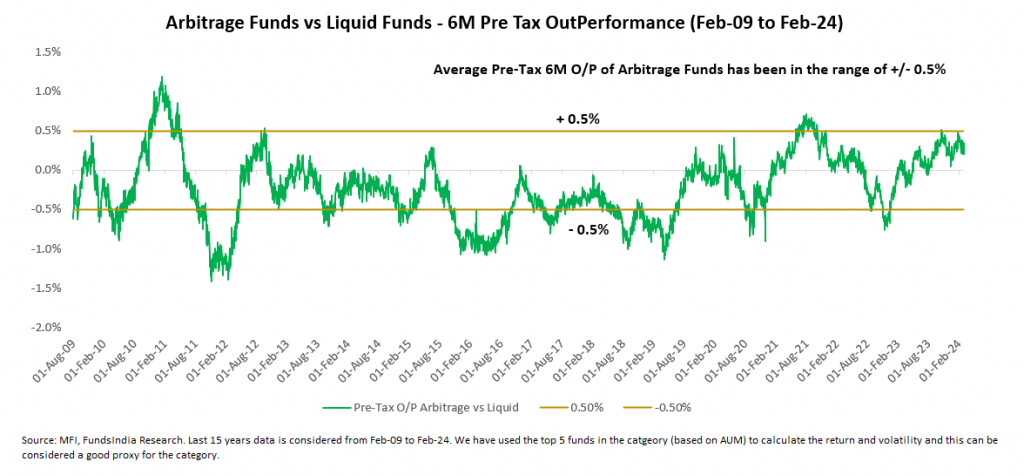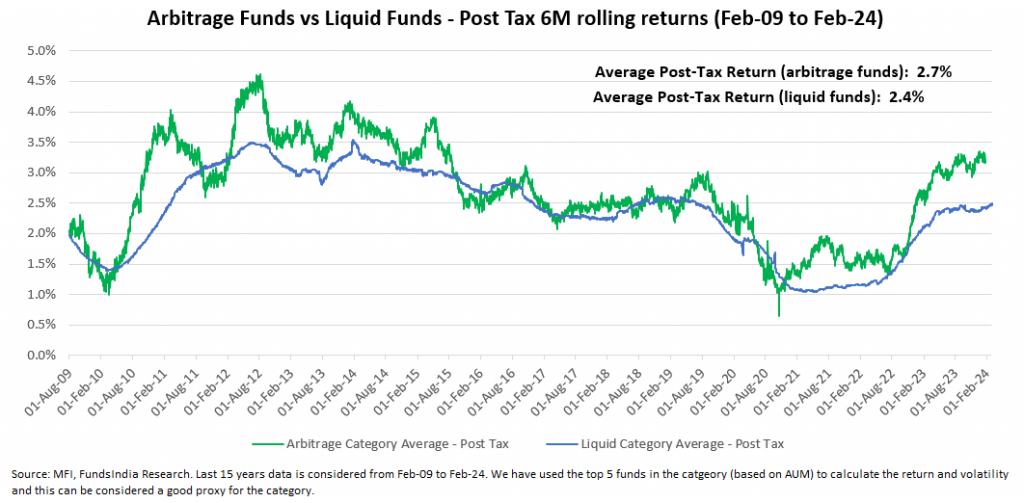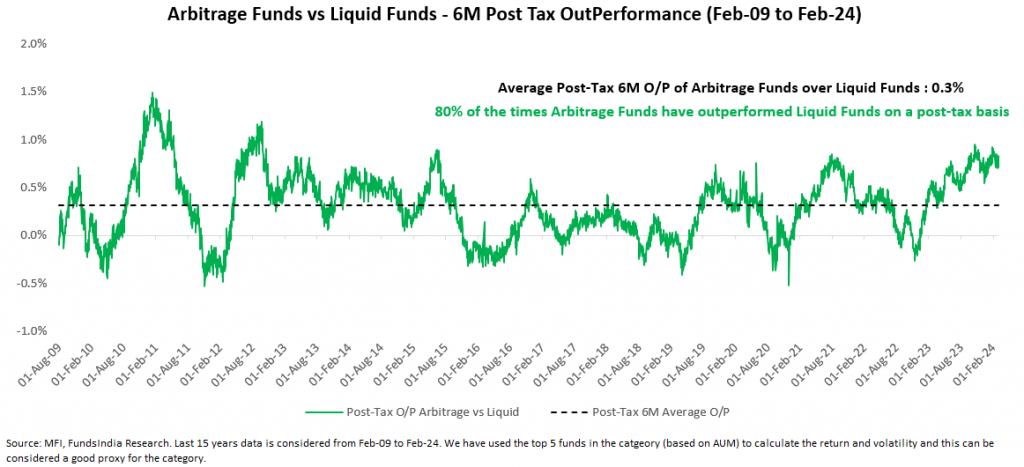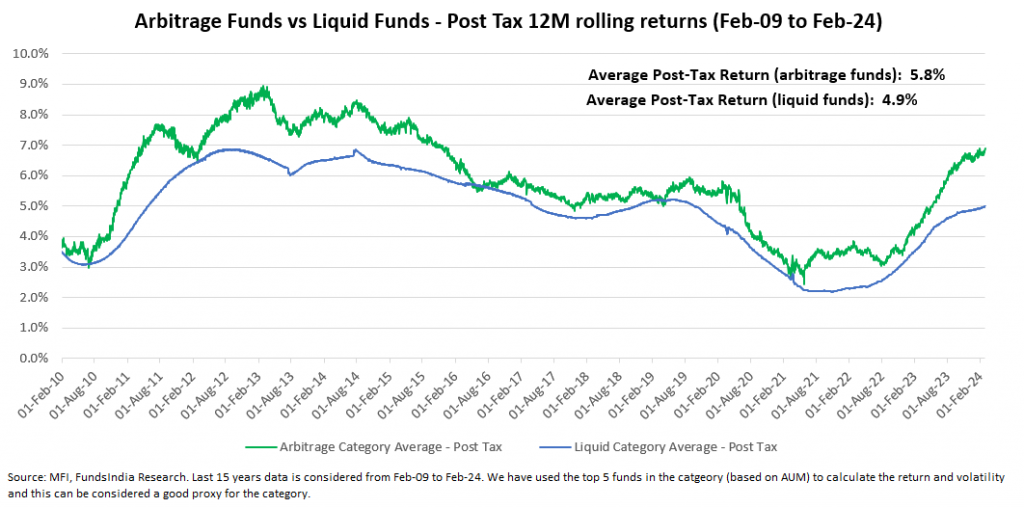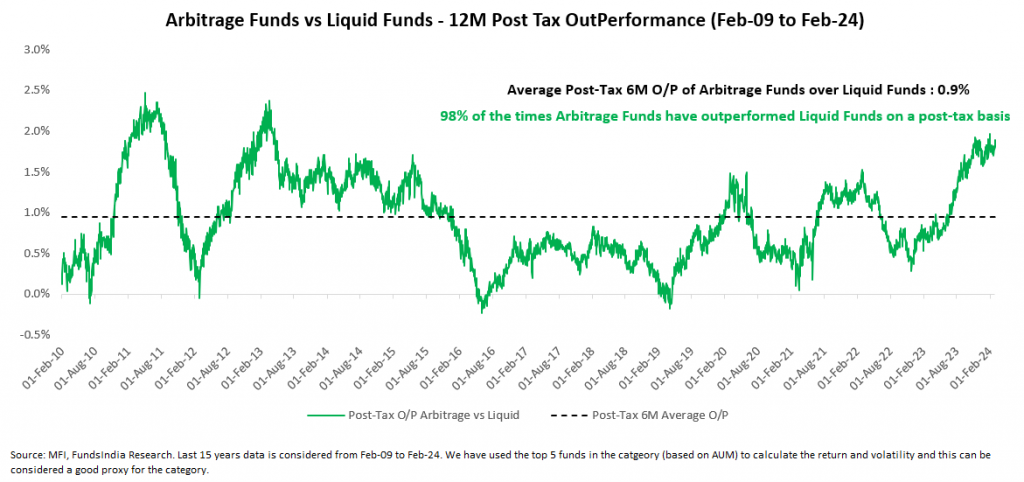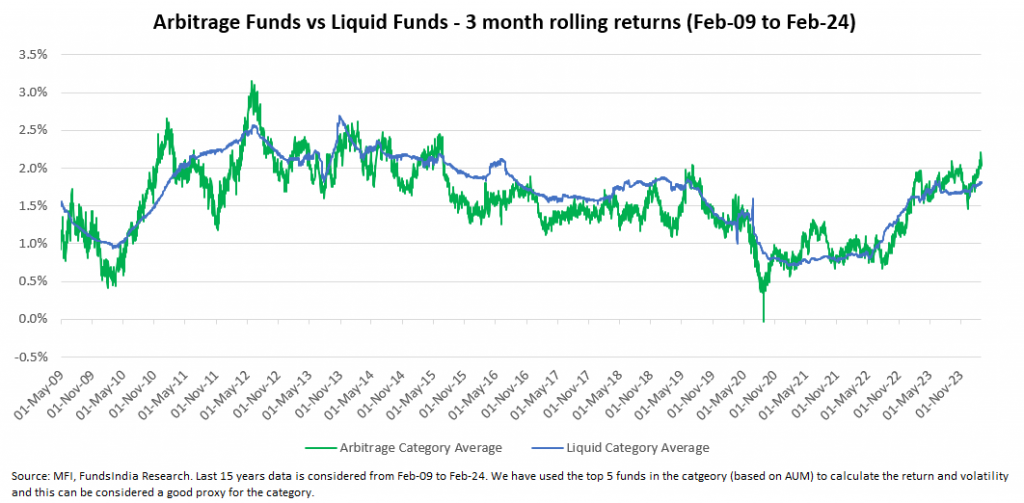
[ad_1]
What are Arbitrage Funds?
Arbitrage Funds are Debt Oriented Hybrid Funds which make investments in a mixture of Arbitrage and Debt/FDs. They normally have 65-75% of their portfolio in ‘Arbitrage’ investments and the remaining 25-30% in ‘Debt/FDs’.
Over a 6 month to 1 12 months interval, arbitrage fund returns are sometimes corresponding to liquid fund returns. However in contrast to liquid funds that are taxed based on your tax slab, arbitrage funds take pleasure in fairness taxation because the funds preserve greater than 65% publicity to arbitrage investments.
For any fund to qualify for fairness taxation, the publicity to Indian equities have to be above 65% of the portfolio. Arbitrage portion although the returns are just like a debt liquid fund is taken into account as fairness from the tax angle because it entails shopping for a inventory within the money market (that’s the inventory market) and promoting it within the futures market.
How do they work?
Arbitrage Funds work on the arbitrage precept the place they make the most of pricing distinction of a specific asset, between two or extra markets. It captures danger free revenue on the transaction.
Probably the most generally used technique by arbitrage funds is the Money Future Arbitrage. Below this technique, arbitrage funds concurrently purchase shares within the money market and promote them within the futures at a barely larger value thereby locking the unfold (danger free revenue) at initiation. At expiry, future value converge with precise inventory value accordingly achieve is realized.
Instance:
What ought to be the return expectation from arbitrage funds?
Allow us to consider this by evaluating the common returns (largest 5 funds) of Arbitrage Funds class vs Liquid Funds class over the past 15 years.
For six month time frames, Pre-tax returns from arbitrage funds are just like liquid funds…
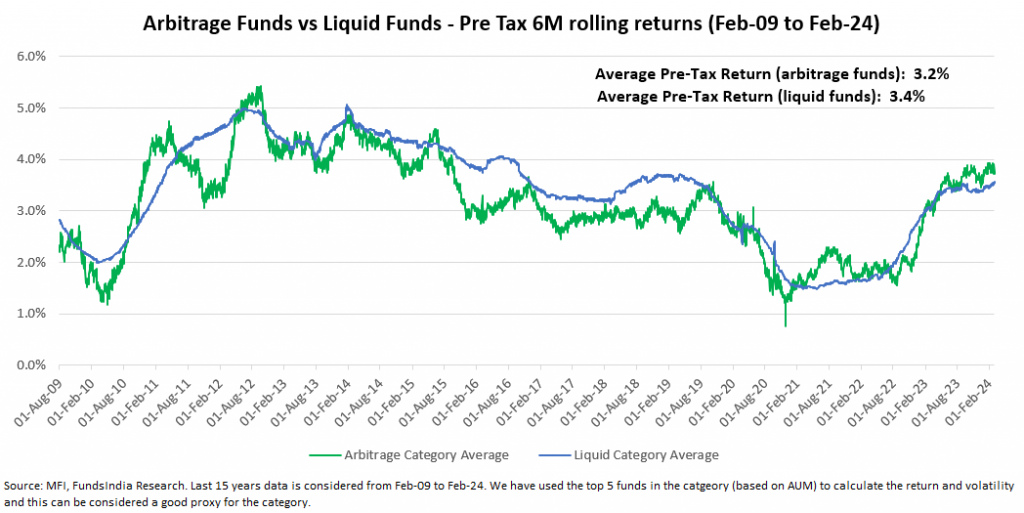
However Submit-tax returns from arbitrage funds are typically higher than liquid funds because of decrease taxation…
Arbitrage funds in contrast to liquid funds take pleasure in fairness taxation..
80% of the occasions Arbitrage Funds on a post-tax foundation have outperformed Liquid Funds over 6 month time frames…
98% of the occasions Arbitrage Funds on a post-tax foundation have outperformed Liquid Funds over 1 12 months frames – common outperformance of 0.9%!
Takeaway: Arbitrage funds are a tax environment friendly various and provide higher post-tax returns in comparison with liquid funds over 6M-1Y time frames
How risky are arbitrage funds in comparison with liquid funds?
We have now evaluated volatility by observing the cases of each day or one-day destructive returns over the past 15 years.
Each day returns for arbitrage funds have been destructive 33% of the occasions vs 0.4% of the occasions for liquid funds…
This improves when you enhance the time frames – Month-to-month returns for arbitrage funds have been destructive solely 0.6% of the occasions vs 0% of the occasions for liquid funds…
No cases of destructive returns for arbitrage funds on a 3 month foundation…
Whereas on a 3 month foundation there aren’t any cases of destructive returns in arbitrage funds, to be on the conservative facet we’d recommend a minimal time-frame of atleast 6 months. Should you can maintain and prolong your time-frame by greater than 1 12 months you then additionally get the good thing about long-term capital positive factors tax.
Takeaway: Arbitrage funds within the brief run, are barely extra risky than liquid fund – make investments with a time-frame of atleast 6 months to 1 12 months
That are the situations beneath which arbitrage fund returns will come beneath strain?
Arbitrage fund returns largely depend upon the spreads between the inventory and the futures market. The spreads can shrink (or worse nonetheless, flip destructive) beneath the next conditions:
- Bearish or Rangebound markets – In bearish or range-bound markets, arbitrage alternatives dry up and an arbitrage fund might have to remain invested in debt or maintain money. Additionally, when the market sentiment is bearish, futures might commerce at a reduction (and never a premium) to the money market implying destructive spreads.
- Rising AUMs of arbitrage funds – Because the AUMs of arbitrage funds develop, there’s more cash chasing arbitrage alternatives and the spreads are likely to go down.
- Falling rates of interest – theoretically, future value is spot value + risk-free charge. Therefore, a fall in rates of interest, implies decrease futures value of a inventory and therefore decrease spreads and decreased arbitrage alternative.
- Decrease borrowing and foreign money hedging prices for FIIs – As these prices come down, there’s elevated FII participation in Indian fairness arbitrage trades. This brings down the general arbitrage spreads out there.
Are Arbitrage Funds best for you?
Arbitrage funds may be thought-about if
- You could have a time-frame of >6 months
- You’re in search of higher publish tax returns than liquid funds
- You’re okay with barely larger momentary volatility (vs liquid funds)
Summing it up
- Arbitrage Funds are debt oriented hybrid funds which make investments in a mixture of arbitrage and debt. They normally have 65-75% in arbitrage with debt and FD’s accounting for the remaining 25-30%.
- Arbitrage Funds generate returns by participating in arbitrage alternatives and making the most of the unfold or the differential within the value of a inventory within the spot market versus its value within the futures market.
- Arbitrage funds are a tax environment friendly various (take pleasure in fairness taxation) and provide higher post-tax returns in comparison with liquid funds over 6M-1Y time frames
- Make investments with a minimal time-frame of atleast 6 months as they’ve barely larger volatility in comparison with liquid funds over shorter time frames. By extending your time-frame to greater than 1 12 months you may as well benefit from the profit of long-term capital positive factors tax (No tax for positive factors lower than Rs 1 lakh and 10% tax for positive factors greater than 1 lakh)
Different articles chances are you’ll like
Submit Views:
23
[ad_2]



